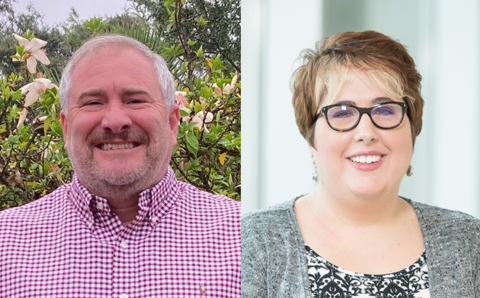In early May of 2020 the Navajo Nation, located in portions of Arizona, New Mexico, and Utah, reported a per-capita rate of COVID-19 infection exceeded only by New York and Louisiana. Many died. Poverty and lack of infrastructure made the area especially vulnerable.
Stanley Jim, pastor of Window Rock Christian Reformed Church on reservation land in Arizona, helps people deal with the trauma.
“It’s gone down dramatically, but it had spiked pretty high,” Jim said.
Last year, Jim was named a distinguished alumnus of Calvin Theological Seminary. He couldn’t receive the award then because of the pandemic, but accepted the honor in person earlier this year.
Like many pastors in the CRC, Jim and members of his church had to be creative when COVID-19 showed up.
“We gather outside for drive-up services, in vehicles parked six feet apart,” Jim said, and also offer the service online.
The pandemic has been Jim’s greatest challenge since he came to Window Rock in 2016 after 17 years working for Christian Reformed Home Missions (now part of Resonate Global Mission). At CRHM he was the driving force behind the Red Mesa Indigenous Leadership Development Program, which cultivates Native pastors and leaders in Navajo and Zuni churches. He also helped move Native churches to self-sufficiency and phase out subsidies from Home Missions.
Then, Jim said, his calling was to return to pastoring a church.
“My passion was really being a pastor,” he said. “I wanted to get back to that.” Jim had served First Navajo CRC in Tohatchi, N. Mex., after his ordination in 1996.
Today it is clear that people are listening to and moved by his preaching in Navajo and English, whether online, in the parking lot, or now again in the church building.
“People are drawn to that,” Jim said. “The elderly are drawn to it, and the young people have learned some of the Navajo language that way. I often hear from them that the message is clearer to understand when you hear it in both languages.”
As he walks the streets of Window Rock, Jim talks with people experiencing poverty, drug addiction, or alcoholism.
“I have conversations with them, listen to them, get to know them, and some lives are changed,” Jim said. “People come to me, non-churchgoers, and they tell me, ‘You are our pastor.’ They come to me asking for prayers.”
His ministry is about building those relationships—a key element of Native American spirituality.
Unlike the dominant white culture, with its emphasis on results even in church, Native culture looks at creating and maintaining that circle of friendships.
“When Jesus ministered here,” Jim said, “his work was about building relationships. One of the things I think Western culture needs to learn is that it’s not so much about results. We as Christians should be more relational.”
About the Author
Nathan Bierma is an educational technologist at CTS.









